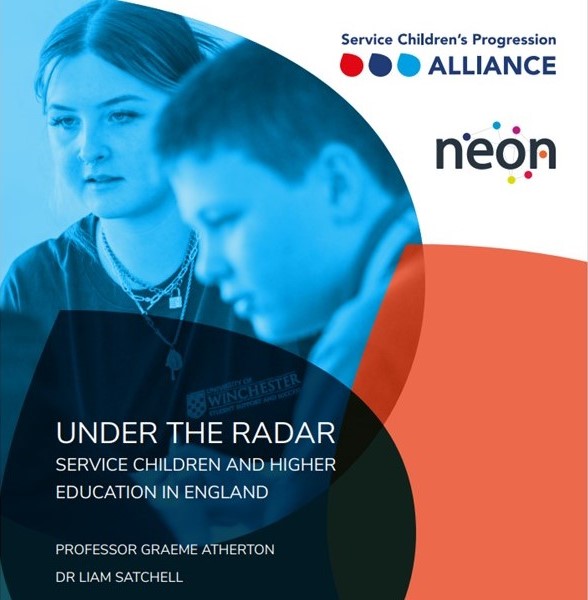
A report undertaken by the University of Winchester has been instrumental in helping widen access to higher education for the children of Armed Forces personnel.
The report, entitled Under the Radar, was prompted by the omission of Service children from the measures used by the Office for Students, the government’s university regulator, to assess widening access to higher education.
The report, co-authored by Dr Liam Satchell, Lecturer in Psychology at the University of Winchester, and Graeme Atherton, Director of the National Education Opportunities Network, found that the disrupted lives of children from Service families often put them at a disadvantage.
It found that children from Service families move schools three times more often than the average, which can disrupt their studies and harm their chances of exam success. They are also often separated from a parent away on active service or postings abroad.
The report authors argued that these twin challenges impact on school attainment, educational engagement, as well as wellbeing and mental health. The report highlights Department for Education data showing a growing gap in progression to higher education when compared to non-Service children.
As a result of the report’s publication, the Office for Students has recently announced it will include service children in the measures is uses to monitor universities, accepting that these children do not have equal opportunities to gain access to higher education.
First, it finds they do not have equal opportunities to receive the information and guidance that will enable them to develop ambition and expectations, or to make informed choice about their higher education options. Second, they do not have equal opportunities to develop the knowledge and skills required to be accepted onto higher education courses that match their expectations and ambitions.
To support these points the Office for Students’ revised regulations cite evidence from the Under the Radar report.
The report was commissioned by Service Children’s Progression Alliance, established by the University of Winchester in 2018 to provide resources for practitioners working with Service children. There are now 12 Hubs across the UK and nearly a thousand members of the Alliance.
The Alliance’s Director, Philip Dent, said: “We are delighted that our swift work to fill the evidence gap regarding Service children and higher education in England has borne fruit. Even the Department for Education’s narrow measure identifies around 80,000 children for whom this change in Office for Students policy represents very good news.
“Clearly identifying Service children as an at-risk group paves the way for universities everywhere to draw on the wealth of evidence and support provided freely by the Service Children’s Progression Alliance.”
Philip said that as England’s 80,000 service children are dispersed right across the country, so every university should be giving special attention to their needs.
He added “New analysis in Under the Radar confirms that Service children are taught in four out of five secondary schools in the UK. In short, there isn’t a university in the country that is not already engaging with schools that have Service children; this report demonstrates that they may be hidden and their unique needs are at risk of being overlooked.”
Indeed, the report found that the percentage of providers who feature Service children in their widening access work has fallen by ten per cent since 2020. Only one in four universities now have any focus on this group. Almost one in five (17 per cent) of universities had not included service children in their widening access work because of a lack of data about the group.
The Alliances’ chair, Sarah Harder-Collins, challenged this often-cited reason adding that there was plenty of evidence available from the Service Children Progression Alliance, the Department of Education and UCAS.
“The data and the support is out there if universities are willing to understand the needs of this cohort,” she said.
An online resource bank built by the Alliance provides schools, colleges, universities and other stakeholders with free access to research and tools to help them improve support for Service children.
The Alliance also offers help to secondary schools in the form of the ‘Thriving Lives Toolkit’, with a project underway to create a similar toolkit for higher education providers.
The Alliance and the University of Winchester featured strongly in the Government’s recent annual report to Parliament on the progress of the Armed Forces Covenant .
The report stated: “Independent research in 2023 demonstrated the considerable impact of the Service Children’s Progression Alliance on the network of professionals and organisations working together to improve Service children’s lives. Through the UK-wide network of 12 Hubs hosted by 21 partners, almost 900 members collaborated on regional programmes of support for Service children and 82 per cent cited the value of the Alliance in enhancing their work.”
Back to media centre